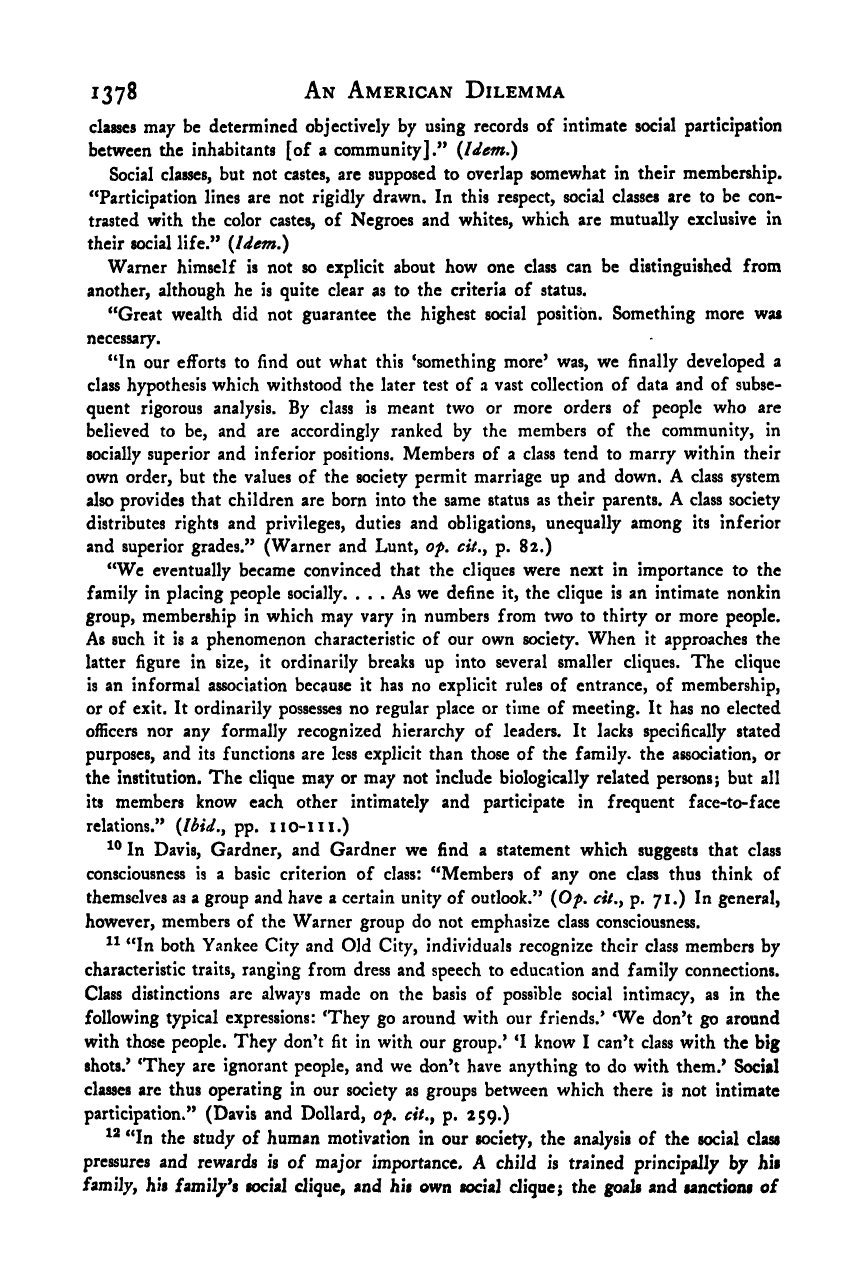Note: Gunnar Myrdal died in 1987, less than 70 years ago. Therefore, this work is protected by copyright, restricting your legal rights to reproduce it. However, you are welcome to view it on screen, as you do now. Read more about copyright.
Full resolution (TIFF) - On this page / på denna sida - Footnotes - Chapter 31

<< prev. page << föreg. sida << >> nästa sida >> next page >>
Below is the raw OCR text
from the above scanned image.
Do you see an error? Proofread the page now!
Här nedan syns maskintolkade texten från faksimilbilden ovan.
Ser du något fel? Korrekturläs sidan nu!
This page has never been proofread. / Denna sida har aldrig korrekturlästs.
1378 An American Dilemma
classes may be determined objectively by using records of intimate social participation
between the inhabitants [of a community].” (Idem,)
Social classes, but not castes, are supposed to overlap somewhat in their membership.
“Participation lines are not rigidly drawn. In this respect, social classes arc to be con-
trasted with the color castes, of Negroes and whites, which are mutually exclusive in
their social life.” (Idem.)
Warner himself is not so explicit about how one class can be distinguished from
another, although he is quite clear as to the criteria of status.
“Great wealth did not guarantee the highest social position. Something more was
necessary.
“In our efforts to find out what this ‘something more’ was, we finally developed a
class hypothesis which withstood the later test of a vast collection of data and of subse-
quent rigorous analysis. By class is meant two or more orders of people who are
believed to be, and are accordingly ranked by the members of the community, in
socially superior and inferior positions. Members of a class tend to marry within their
own order, but the values of the society permit marriage up and down. A class system
also provides that children are born into the same status as their parents, A class society
distributes rights and privileges, duties and obligations, unequally among its inferior
and superior grades.” (Warner and Lunt, of. cit.y p. 82.)
“We eventually became convinced that the cliques were next in importance to the
family in placing people socially, ... As we define it, the clique is an intimate nonkin
group, membership in which may vary in numbers from two to thirty or more people.
As such it is a phenomenon characteristic of our own society. When it approaches the
latter figure in size, it ordinarily breaks up into several smaller cliques. The clique
is an informal association because it has no explicit rules of entrance, of membership,
or of exit. It ordinarily possesses no regular place or time of meeting. It has no elected
officers nor any formally recognized hierarchy of leaders. It lacks specifically stated
purposes, and its functions are less explicit than those of the family, the association, or
the institution. The clique may or may not include biologically related persons; but all
its members know each other intimately and participate in frequent face-to-face
relations.” (Ibid.y pp. iio-lil.)
In Davis, Gardner, and Gardner we find a statement which suggests that class
consciousness is a basic criterion of class: “Members of any one class thus think of
themselves as a group and have a certain unity of outlook.” (Of. cit.y p. 71.) In genera],
however, members of the Warner group do not emphasize class consciousness.
“In both Yankee City and Old City, individuals recognize their class members by
characteristic traits, ranging from dress and speech to education and family connections.
Class distinctions are always made on the basis of possible social intimacy, as in the
following typical expressions: ‘They go around with our friends.’ ‘We don’t go around
with those people. They don’t fit in with our group.’ ‘I know I can’t class with the big
shots.’ ‘They are ignorant people, and we don’t have anything to do with them.’ Social
classes are thus operating in our society as groups between which there is not intimate
participation.” (Davis and Dollard, of. cit.y p, 259.)
“In the study of human motivation in our society, the analysis of the social class
pressures and rewards is of major importance. A child is trained principally by his
family, his family’s social clique, and his own social clique; the goals and sanctions of
<< prev. page << föreg. sida << >> nästa sida >> next page >>